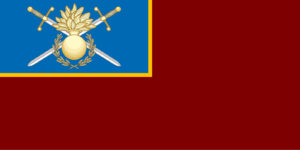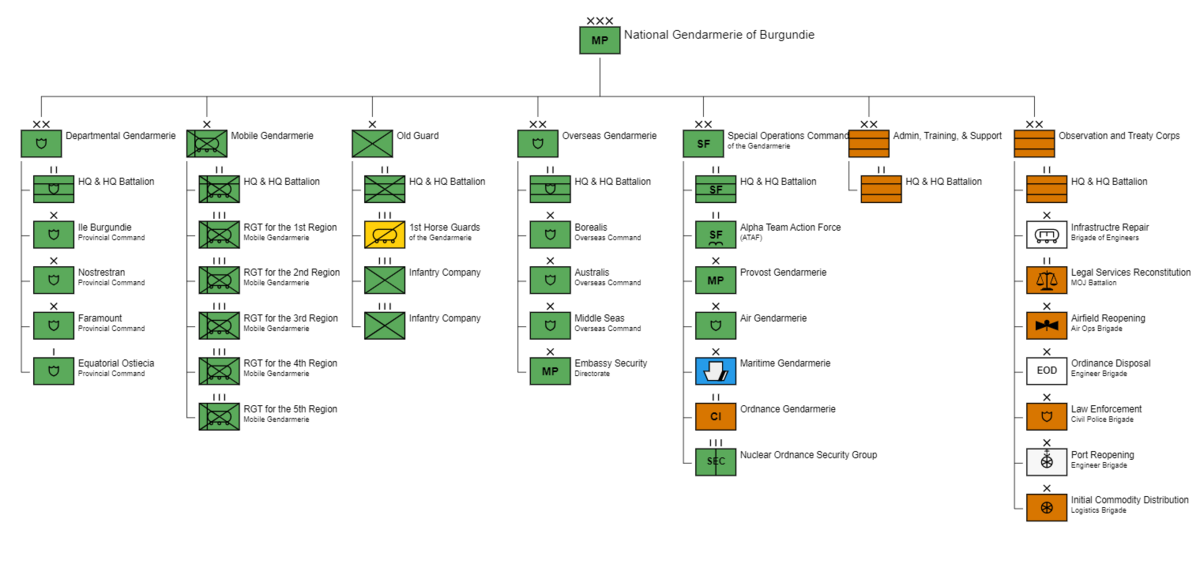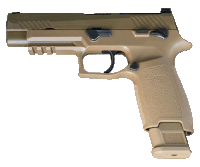National Gendarmerie of Burgundie
| National Gendarmerie | |
|---|---|
| Gendarmerie nacional | |
 | |
| Active | 1850–present |
| Allegiance | |
| Branch | |
| Type | Gendarmerie (Military provost) |
| Role | Counter terrorism, Law enforcement, Infantry |
| Size |
|
| Garrison/HQ | Vilauristre |
| Commanders | |
| Capitaine Comandant | Madeliene-Hester Tibault Boulasard |
The National Gendarmerie (Burg Gendarmerie nacional} is one of two national police forces of Burgundie, along with the National Constabulary of Burgundie. It is a branch of the Burgoignesc Security Forces placed under the jurisdiction of the Ministry of the Interior—with additional duties to the Ministry of Civil Defense Security. Its area of responsibility includes smaller towns, rural and suburban areas, while the National Constabulary of Burgundie—a civilian force—is in charge of cities and downtowns. Due to its military status, the Gendarmerie also fulfills a range of military and defense missions. The Gendarmes also have a cybercrime division. It has a strength of more than 215,000 personnel as of 2028.
The Gendarmerie is heir to the Sergents della Marechaussee (Sergeants of the Marshalcy), the land-based law enforcement element of the Revenue Guard, dating back to the Middle Ages. It has influenced the culture and traditions of gendarmerie forces all around the world—and especially in the Burgoignesc Thalattocracy.
History
Formed in 1148 by the Triumverate Council of Archbishopric of Rabascall-Bergendia formed the precursor to the modern Revenue Guard was a royal institution commanded by a Lord Commandant who oversaw three Sergeants known as the Sergents della Marechaussee (Sergeants of the Marshalcy), responsible for collecting taxes and arresting highwaymen, and three Captains known as the Capitaines della Guardacostes (Captains of the Coast Guard), responsible for collecting tariffs and suppressing smuggling and piracy.
In 1849, with the start of the First Fratricide, Dantoine Marius, Duke of Bourgondi established the Capitaines della Guardacostes, simply calling them the Revenue Guard. In 1851, Dantoine used the Sergents della Marechaussee concept to make the Gendarmes d'elite della Gaurdie Real (Elite Gendarmes of the Royal Guard), removing the land-based responsibilities of the Revenue Guard and forming a gendarmerie based on the Custodes Yonderre after the reformation in 1833. At the end of the war, the newly acquired territories still maintained their individual forms of policing. In the 1921 Policing Reform Act policing was centralized and the various forms of gendarmeries, noble/royal guard units with law-enforcement responsibilities and regimental military policing units were consolidated into the Gendarmerie nacional.
Organization

The main components of the organization are the following:
- The Departmental Gendarmerie — organized in 9 Regions of the Departmental Gendarmerie (one for each of the 9 provinces of the Burgundian Metropole), each reporting directly to the Capitaine Commandant (Chief Commandant)
- The Mobile Gendarmerie — organized in 5 Regions of the Mobile Gendarmerie (one for each of the 5 military regions of Burgundie, called Zones of Civil Defense and Security of Burgundie). 2 of the regions maintain the Mobile Armored National Gendarmerie (MANG), who are equipped with heavy armor and APCs for use in cases of violent interdiction and civil unrest
- The Velle guardie (Old Guard)— organized as a separate military corps in one cavalry and two infantry regiments (all three battalion-sized) and specialized units for training and logistical support. It provides protection and ceremonial guard for the President of The Citizens Court of the National Assembly, the Prime Minister, their official residencies and the chambers of the Citizens Court of the National Assembly.
- The Overseas Gendarmerie — in charge of Burgundian overseas crown lands, colonies, provinces, and territories, bringing together the different gendarmerie branches under unified commands in the respective overseas territories. It is also tasked with providing security to the Burgundian embassies and consulates overseas.
- Five specialized Gendarmerie branches:
- Air Gendarmerie — military police for the Royal Air Service of Burgundie and crash scene investigations involving Burgundian military aircraft under the dual subordination of the National Gendarmerie and the Royal Air Service.
- Maritime Gendarmerie — military police for the Navy of Burgundie and maritime units of the Revenue Guard under the dual subordination of the National Gendarmerie and the Burgoignesc Maritime Prefecture.
- Air Transport — security force for the civil aviation under the dual subordination of the National Gendarmerie and the Ministry of Transportation.
- Ordnance Gendarmerie — security and counter-intelligence force for the Director General of the Arsenal (DGA), the armament and equipment procurement, development and maintenance agency of the Burgundian Ministry of Civil Defence and Security.
- Nuclear Ordnance Security Group— security force for the Burgundian nuclear power plants and government nuclear research facilities, directly subordinated to the Minister of Civil Defence and Security.
- The Provost Gendarmerie — military police for overseas deployments. (The functions of military police for the Army of Burgundie in the Burgundian Metropole are fulfilled by units of the Mobile Gendarmerie).
- Alpha Team Action Force (ATAF): One of the two premier Counter-terror formations of Burgundie. Its counterpart within the National Police of Burgundie is the Fast Action Crisis Team (FACT).
- Operational support formations, such as the Gendarmerie air service, the forensic teams, high mountain rescue platoons, canine units, riverine, lake and diver support units etc.
- The education and training establishment
- The administration and support establishment
The above-mentioned organizations report directly to the Capitaine Commandant (Chief Commandant) with the exception of the Vella guardia, which reports to the Isle of Burgundie Region of the Departmental Gendarmerie.
Observation and Treaty Corps
Equipment
Vehicles
| Name | Specifications | Image | Role(s) |
|---|---|---|---|
| MILCAR Culebra VTM | *Mass: ± 12,800 kg (kerb)
|

|
Small arms
Service weapons
| Name | Origin | Type | Calibre | Photo | Notes |
|---|---|---|---|---|---|
| MAG-17CY | Pistol | 9mm parabellum | 
|
||
| IMBEL MD97 | Battle rifle | 7.62mm | 
|
Standard issue rifle for the Metropole Forces. Will phase out in favor of the HAMR/SAR-99L over the next 5-10 yrs. |
See also
- Revenue Guard, maritime gendarmerie of Burgundie
- Custodes Yonderre is the basis on which the Gendarmerie is designed.
- Urban Cohort, Caphirian gendarmerie